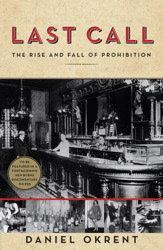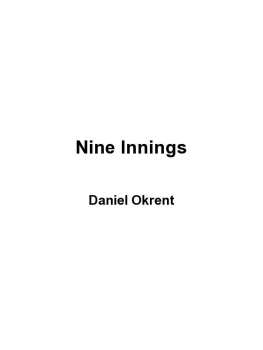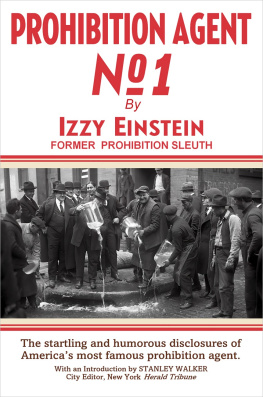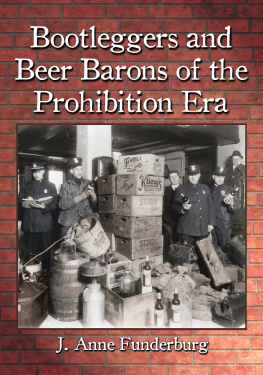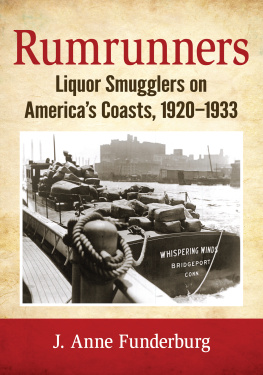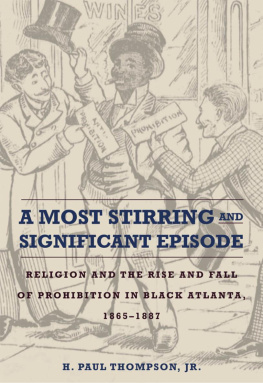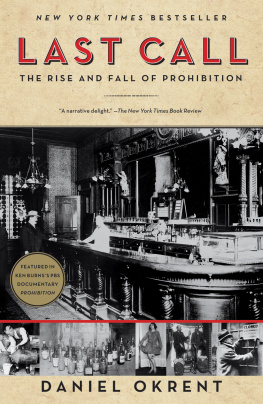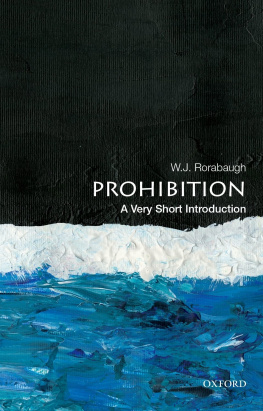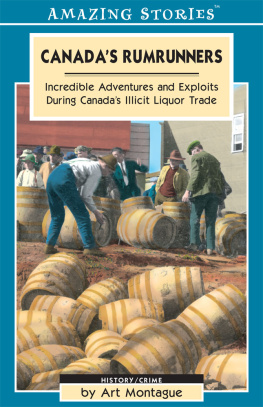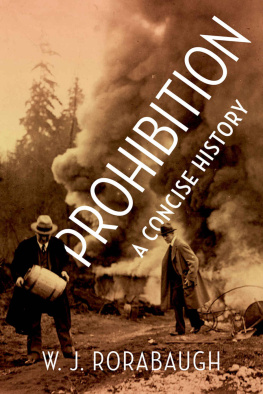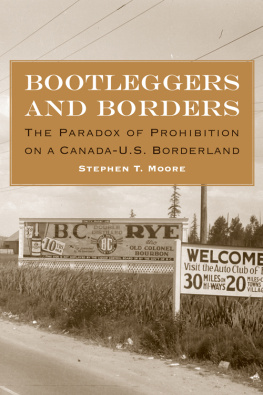
ALSO BY THE AUTHOR
Nine Innings
The Way We Were: New England Then, New England Now
Great Fortune: The Epic of Rockefeller Center
Public Editor #1
LAST CALL

The Rise and Fall of Prohibition

DANIEL OKRENT

Credits, photo inserts:Courtesy of J. P. Andrieux and Flanker Press 29, 31; AP/Wide World Photos 26, 49; Bettman/CORBIS 8, 14, 23, 30, 45, 50, 56, 57, 60; Brown Brothers 3, 10, 17, 33, 52, 55; Brown University Library 20, 21; Catholic University of America 46; the great-grandchildren of Georges de Latour 32; Hagley Museum and Library 28; Hulton Archive/Getty Images 61, 62; Kansas State Historical Society 7; Library of Congress 2, 9, 11, 12, 13, 22, 24, 25, 47; Maryland Historical Society 59; New York Post /SplashNews 54; Ohio Historical Society 1; Rutgers Center for Alcohol Studies 4, 5; TavernTrove.com 3943; 21 Club 53; Underwood & Underwood 34; Walter P. Reuther Library, Wayne State University 19, 27, 48, 51, 58; authors collection 6, 15, 16, 18, 3538, 44.

SCRIBNER
A Division of Simon & Schuster, Inc.
1230 Avenue of the Americas
New York, NY 10020
www.SimonandSchuster.com Copyright 2010 by Last Laugh, Inc.All rights reserved, including the right to reproduce this book or portions thereof in any form whatsoever. For information, address Scribner Subsidiary Rights Department, 1230 Avenue of the Americas, New York, NY 10020.First Scribner hardcover edition May 2010 SCRIBNER and design are registered trademarks of The Gale Group, Inc., used under license by Simon & Schuster, Inc., the publisher of this work.For information about special discounts for bulk purchases, please contact Simon & Schuster Special Sales at 1-866-506-1949 or business@simonandschuster.com.The Simon & Schuster Speakers Bureau can bring authors to your live event. For more information or to book an event, contact the Simon & Schuster Speakers Bureau at 1-866-248-3049 or visit our website at www.simonspeakers.com . Book design by Ellen R. Sasahara Manufactured in the United States of America1 3 5 7 9 10 8 6 4 2Library of Congress Control Number: 2009051127ISBN 978-0-7432-7702-0ISBN 978-1-4391-7169-1 (ebook)
For my sister, Judith Simon,
and in memory of absent friends:
Robert N. Nylen (19442008)
Richard Seaver (19262009)
Henry Z. Steinway (19152008)
Contents


THE EIGHTEENTH AMENDMENT TO THE
CONSTITUTION OF THE UNITED STATES
Ratified January 16, 1919
Section 1.
After one year from the ratification of this article the manufacture, sale, or transportation of intoxicating liquors within, the importation thereof into, or the exportation thereof from the United States and all territory subject to the jurisdiction thereof for beverage purposes is hereby prohibited.
Section 2.
The Congress and the several States shall have concurrent power to enforce this article by appropriate legislation.
Section 3.
This article shall be inoperative unless it shall have been ratified as an amendment to the Constitution by the legislatures of the several States, as provided in the Constitution, within seven years from the date of the submission hereof to the States by the Congress.
Prologue

January 16, 1920
T
HE STREETS OF were jammed. A frenzy of cars, trucks, wagons, and every other imaginable form of conveyance crisscrossed the town and battled its steepest hills. Porches, staircase landings, and sidewalks were piled high with boxes and crates delivered on the last possible day before transporting their contents would become illegal. The next morning, the Chronicle reported that people whose beer, liquor, and wine had not arrived by midnight were left to stand in their doorways with haggard faces and glittering eyes. Just two weeks earlier, on the last New Years Eve before Prohibition, frantic celebrations had convulsed the citys hotels and private clubs, its neighborhood taverns and wharfside saloons. It was a spasm of desperate joy fueled, said the Chronicle , by great quantities of bottled sunshine liberated from cellars, club lockers, bank vaults, safety deposit boxes and other hiding places. Now, on January 16, the sunshine was surrendering to darkness.
San Franciscans could hardly have been surprised. Like the rest of the nation, theyd had a years warning that the moment the calendar flipped to January 17, Americans would only be able to own whatever alcoholic beverages had been in their homes the day before. In fact, Americans had had several decades warning, decades during which a popular movement like none the nation had ever seena mighty alliance of moralists and progressives, suffragists and xenophobeshad legally seized the Constitution, bending it to a new purpose.
Up in the Napa Valley to the north of San Francisco, where grape growers had been ripping out their vines and planting fruit trees, an editor wrote, What was a few years ago has happened. To the south, Ken Lillypresident of the Stanford University student body, star of its baseball team, candidate for the U.S. Olympic track teamwas driving with two classmates through the late-night streets of San Jose when his car crashed into a telephone pole. Lilly and one of his buddies were badly hurt, but they would recover. The forty-gallon barrel of wine theyd been transporting would not. Its disgorged contents turned the street red.
Across the country on that last day before the taps ran dry, Golds Liquor Store placed wicker baskets filled with its remaining inventory on a New York City sidewalk; a sign read , $1. Down the street, Bat Masterson, a sixty-six-year-old relic of the Wild West now playing out the string as a sportswriter in New York, observed the first night of constitutional Prohibition sitting alone in his favorite bar, glumly contemplating a cup of tea. Under the headline GOODBYE, OLD PAL !, the American Chicle Company ran newspaper ads featuring an illustration of a martini glass and suggesting the consolation of a Chiclet, with its exhilarating flavor that tingles the taste.
In that same night, federal officers shut down two illegal stills (an act that would become common in the years ahead) and reported that their operators had offered bribes (which would become even more common). In northern Maine, a paper in New Brunswick reported, Canadian liquor in quantities from one gallon to a truckload is being hidden in the northern woods and distributed by automobile, sled and iceboat, on snowshoes and on skis. At the Metropolitan Club in Washington, Assistant Secretary of the Navy Franklin D. Roosevelt spent the evening drinking champagne with other members of the Harvard class of 1904.
There were of course those who welcomed the day. The crusaders who had struggled for decades to place Prohibition in the Constitution celebrated with rallies and prayer sessions and ritual interments of effigies representing John Barleycorn, the symbolic proxy for alcohols evils. No one marked the day as fervently as evangelist Billy , who conducted a revival meeting in Norfolk, Virginia. Ten thousand grateful people jammed Sundays enormous tabernacle to hear him announce the death of liquor and reveal the advent of an earthly paradise. The reign of tears is over, Sunday proclaimed. The slums will soon be only a memory. We will turn our prisons into factories and our jails into storehouses and corncribs. Men will walk upright now, women will smile, and the children will laugh. Hell will be forever for rent.
Next page
